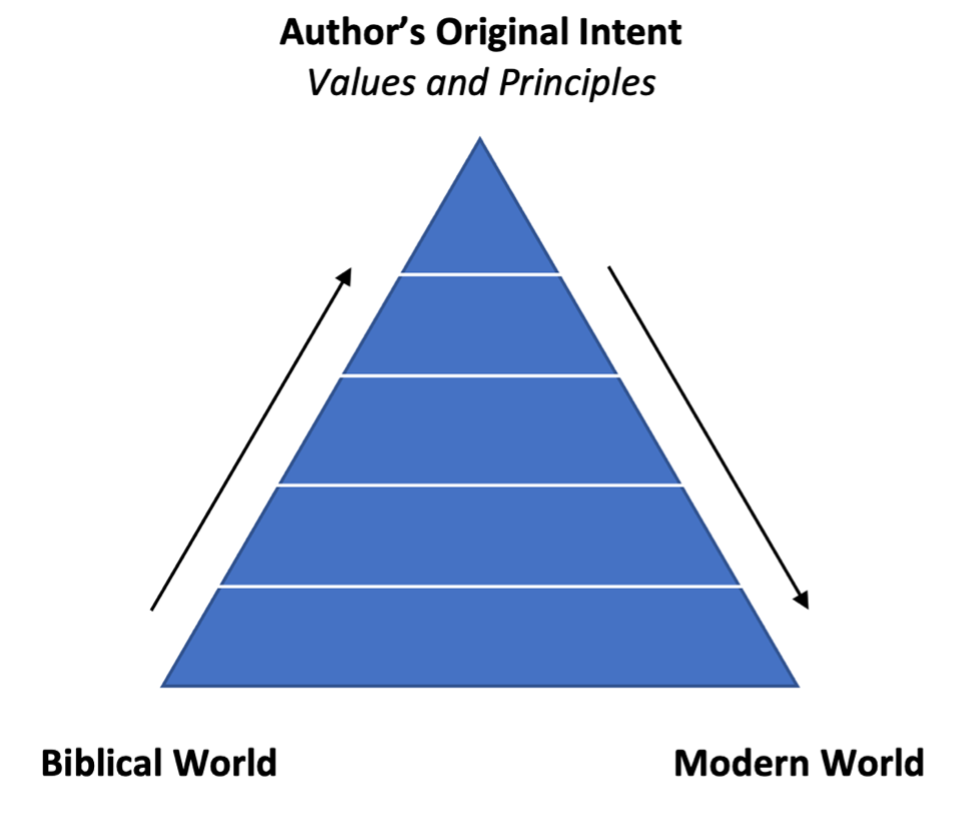
SESSION 8 | Fidelity and Walking with God
The Bible is incredibly relevant when we take the time to understand what it intends to say. You are not alone if you’ve ever been intimidated or struggled with understanding it. Let’s learn how to interpret it responsibly.
We will use Zechariah 3:6-7 of our study to walk through the process of bringing the ancient text into our modern world using the Ladder of Abstraction (introduced in Session One).
A Key to Understanding the Bible
Sometimes, biblical texts apply directly to our modern situation. Jesus says, “Love your enemies.” The meaning is simple: If you have enemies, choose to love them. Other texts can only be translated into our contemporary culture by understanding the circumstances and the author’s intended meaning.
For example—
Let’s say I ask the question, as many Christians did in the last century, “Is slavery wrong?” I go to Paul, who does talk about slavery. But I discover when I get into his world that he’s not necessarily answering my questions about the nineteenth century in America, because the slavery Paul talks about isn’t the slavery we knew in the United States in the nineteenth century or throughout the world today.
In the first century, people sold themselves into slavery because they were economically better off as slaves, protected by their owners, than they were free. Most slaves were freed by age 30 because, in that day, maintaining slaves was economically difficult. Roman law said an owner could not handle slaves any way he wanted to. And if you walked down the streets of Rome, you could not tell the slaves from the free by the color of their skin.
If I don’t realize that Paul’s situation and mine are different, I may apply Paul’s advice about slaves in a way that was never intended.[1]
Key principle: We cannot make a passage mean something today that it did not mean in principle in the ancient world. We have to do the necessary work to understand the historical context.
Picture a ladder or pyramid rising from the biblical world and, like a bridge, crossing over and down into our modern setting. Often, when interpreting a passage of Scripture, if we can’t bring the meaning straight across, we must move up the ladder of abstraction until we reach the author’s intent—the principle or value—to bring it over into our world. In every case, scripture communicates some value or principle regarding God’s character or personality, human nature, or the reality of our world.

Applying the Ladder of Abstraction to Zechariah 3:7a
6 The angel of the Lord gave this charge to Joshua: 7 “This is what the Lord Almighty says: ‘If you will walk in obedience to me and keep my requirements, then you will govern my house and have charge of my courts, and I will give you a place among these standing here.
First, notice the conditional clause, “If. . .then.” Here in Session 8, we will tackle the “If” part.
After being forgiven and cleansed from sin, Joshua—symbolic of the people of Israel—is restored to his role as the high priest. The angel of the Lord encourages him to “. . .walk in obedience to me and keep my requirements.” Since we are not an ancient Hebrew high priest, what does this mean for 21st-century people?
Sometimes, we can journey from the biblical text to the modern world by going straight across, e.g., “Do not commit adultery.” Other times, when the principle or value is embedded in ancient Hebrew civil or ceremonial law or custom, we must go up the Ladder of Abstraction to the level of principles and values. The study notes under “What Does it Mean?”—like your background work via Bible Hub, commentaries, or other Bible study tools— give us insight into the author’s original intent.
When God asks him to “walk in obedience to me and keep my requirements,” He invites Joshua to live in fidelity to His purpose and possibilities in the world. Fidelity is about faithfulness and loyalty, precisely the opposite of Israel’s behavior. Here, God is restoring Joshua and Israel to a relationship with Him.
Remember, this is not about ‘rule-following,’ as if returning to the black-and-white rules that have just been summarily dismissed. The context tells us that Joshua is being invited to respond to grace out of love.
The New Testament expresses a similar idea in John 14:23-24:
23 Jesus replied, “Anyone who loves me will obey my teaching. My Father will love them, and we will come to them and make our home with them. 24 Anyone who does not love me will not obey my teaching.
The natural, unfiltered human response to radical forgiveness and love is fidelity. Joshua is now being asked to join God’s work in this world, not according to rules, but as a response of faithfulness to God’s love.
And, so it is with us.
PREPARING TO PARTICIPATE – Relinquish
In her book, The Writing Life, Annie Dillard captures the kind of impact spiritual listening can have in shaping our lives:
“How we spend our days is, of course, how we spend our lives.”
When we choose to live a life unaware of Jesus’ invitations, we end up living a self-directed life.
Listen for the longings of your heart, and notice what they are attached to.
ABSORBING SCRIPTURE – Read
After mastering the text, work hard at allowing the text to master you. Be aware of how God wants to meet you here.
Zechariah 3:1-7
1 Then he showed me Joshua the high priest standing before the angel of the Lord, and Satan standing at his right side to accuse him. 2 The Lord said to Satan, “The Lord rebuke you, Satan! The Lord, who has chosen Jerusalem, rebuke you! Is not this man a burning stick snatched from the fire?”
3 Now Joshua was dressed in filthy clothes as he stood before the angel. 4 The angel said to those who were standing before him, “Take off his filthy clothes.”
Then he said to Joshua, “See, I have taken away your sin, and I will put fine garments on you.”
5 Then I said, “Put a clean turban on his head.” So they put a clean turban on his head and clothed him, while the angel of the Lord stood by.
6 The angel of the Lord gave this charge to Joshua: 7 “This is what the Lord Almighty says: ‘If you will walk in obedience to me and keep my requirements, then you will govern my house and have charge of my courts, and I will give you a place among these standing here.
WHAT DOES IT MEAN? – Think
Let’s explore some key ideas here. Remember: Try free online resources like BibleHub.com, Biblegateway.com, and Blueletterbible.org. They help us master the text, so the text can master us.
Key Observations:
GAVE THIS CHARGE
Hebrew, amar, translated as “solemnly assured” in the ESV conveys the more positive aspect of the Angel of the Lord’s charge. While this term is used in other OT passages with the connotation of “warn,” which implies curses for disobedience to the Angel’s message, the grammar here only promises blessings for fidelity. There are no curses here.
This is a confirmation of ‘The Rulebreaker’s’ action in sidestepping the entire Law to offer salvation through grace alone.
THE LORD ALMIGHTY
Literally, “Lord, or Yahweh of Hosts.” This is a title used in the Old Testament referring to God as the ruler of the heavenly armies or celestial beings. The term “hosts” generally signifies a multitude or army, emphasizing God’s unquestioned power and authority. It reflects themes of divine sovereignty, protection, and the assurance of victory in spiritual battles.
In other words, the all-powerful God with authority over all creation, including the spiritual realm, invites you into what He has established and will sustain—forgiving, glorying in, and now reestablishing the high priest and His people Israel.
This is who you are dealing with—the One who watches over us and is powerful enough to preserve His purpose for our lives.
WALK IN OBEDIENCE
Hebrew, halak, means “if you come on, continually pursue.” It refers to the personal attitude of Joshua toward God, evidenced by authentic faithfulness and loyalty motivated not by obligation, but as a response to love.
Obedience (NASB) is the Hebrew, derek, literally, “way, road, journey.” The majority of translations use, “walk in my ways.” The picture is that of an established rut in a dirt road, formed by wagon wheels during the rainy season. It’s about alignment. That is, ‘walk with me. Place yourself in My wagon tracks and trust me for where they lead. Align yourself with My ways—My dreams and designs for your life.”
Critical distinction: The choice of fidelity is portrayed as the result of the experience of being chosen—forgiven, cleansed, and celebrated as God’s glory—not the cause of it.
KEEP MY REQUIREMENTS
This is a parallel statement to “Walk in obedience.”
The grammar makes a strong argument that the Hebrew words here “contain, in the form of a promise, a privilege which is set before the high priest as awaiting him in the future—namely, the privilege of still further attending to the service of the house of God, which has been called into question by Satan’s accusation.” (Keil and Delitzsch, Minor Prophets, Zechariah, 256).
This privilege is part of the ongoing glorification of Joshua, the role of the high priest, and the people of Israel.
We see this same principle of full restoration and celebration in the Parable of the Lost Sons (Luke 15). The father (representing God’s posture toward us) forgives his returning son, fully restores his privileges as a family member—the father’s robe, family signet ring, sandals (indicating not a servant)—and celebrates his homecoming with the feast of a fatted calf. Similarly, Joshua the high priest and the people of Israel, are both forgiven, cleansed, and celebrated as the glory of God.
Instead of the obligation of duty, or ‘earning your way back,’ the response of love is the restoration of privilege.
WHAT DOES IT MEAN FOR ME? – Pray
Not, “What does it mean to you? but “What does it mean for you?”
“Fidelity” in this passage is described as a natural result of being forgiven, cleansed, gloried in, and restored, not the cause of such.
What is your core motivation for being faithful and loyal to God?
What keeps you, in any way, from trusting God?
CHOOSING GOD’S INVITATIONS – Respond
This is about activating our will and aligning our thinking and feelings with what God is inviting us into.
In what ways is your understanding or experience of God the same or different from what is presented in this passage?
What are you invited to pay attention to here? What choices do you need to make about how you understand or experience God? And how you understand and experience yourself?
TO PONDER
Prayerful interaction with a photograph, icon, painting, or other visual representation can allow us to experience the divine uniquely and powerfully. Focus your attention on the part of the image that first catches your eye. Try to keep your eyes from wandering to other parts of the picture. Breathe deeply and let yourself gaze at that part of the image for a minute or so. Then, explore the whole image. See it all and reflect on what you experience.

Christ Carrying the Cross,
Altobello Melone (c. 1515)
Christ carries the Cross on which he will be crucified. The tight cropping of the scene and the extremes of light and dark heighten the emotional charge and drama of this painting. The focus is on Christ, who raises his right hand, possibly in a gesture of blessing. His arm and hand appear to project from the painting into our space. He looks slightly away from us as if turning to one of the holy women or the Virgin Mary, who accompanied him on his journey. A soldier’s raised fist clasps the rope around Christ’s neck; his face and the reflection on his helmet emerge from the darkness out of which Christ moves. The head of another soldier painted behind the Cross is now barely visible except in extreme light.
Question:
What does the image stir up or bring forth in you?
In what ways does this image lead you to pray? Or not pray?
[1] “The Heresy of Application: An Interview with Haddon Robinson.” Leadership Journal, Fall 1997, 10. https://www.christianitytoday.com/1997/10/heresy-of-application/